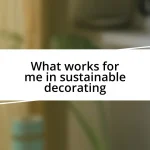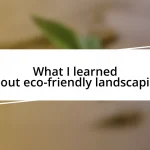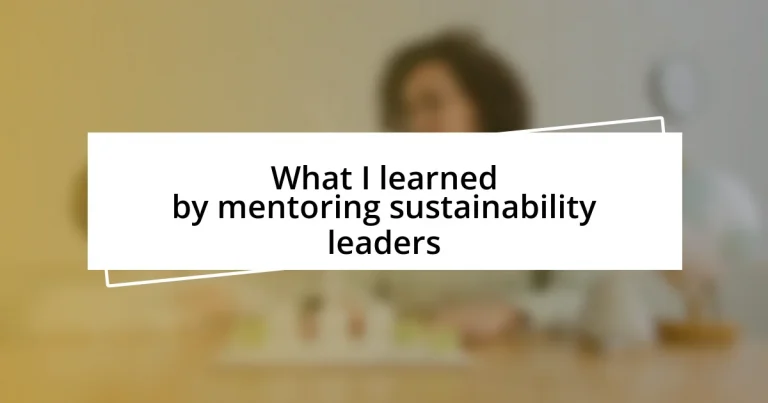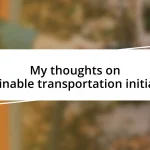Key takeaways:
- Sustainability leadership emphasizes inspiring others and requires empathy and resilience to navigate challenges effectively.
- Building trust through mutual understanding and transparency fosters a strong mentor-mentee relationship, enhancing growth and confidence.
- Encouraging innovative thinking involves diverse perspectives and creative exercises, with a continuous improvement approach to mentoring methodologies.
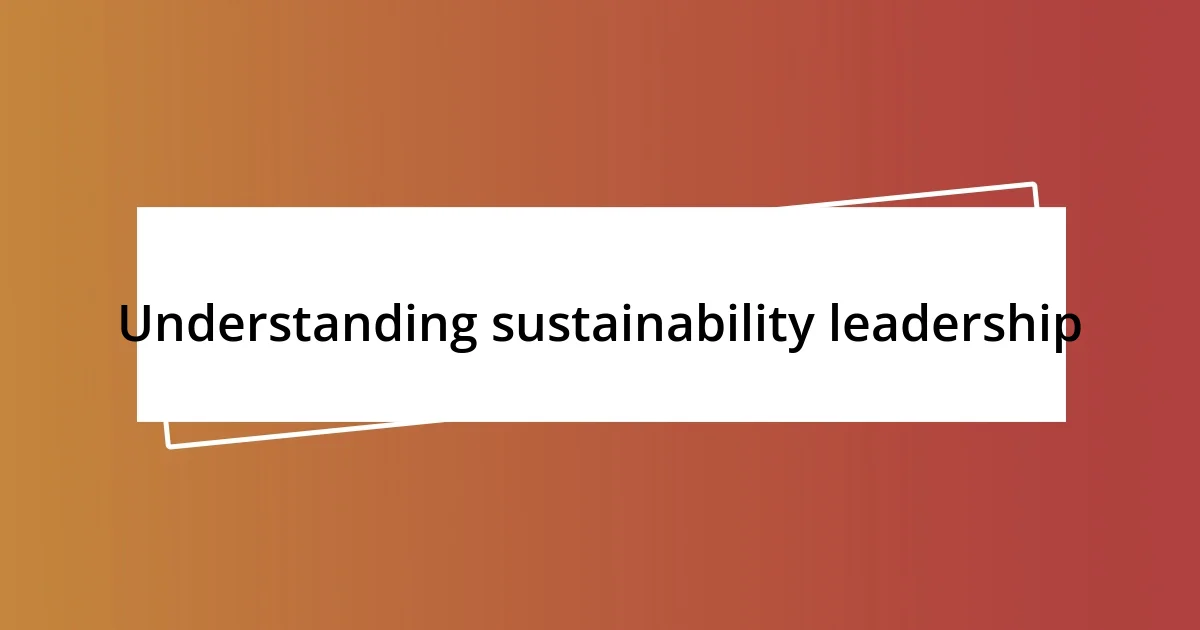
Understanding sustainability leadership
Sustainability leadership goes beyond just implementing eco-friendly practices; it embodies a commitment to inspiring others towards a greater purpose. I remember my first encounter with a sustainability leader who sparked my passion for this field. It was during a community event where they meticulously explained how small local projects could have a ripple effect on global sustainability. Have you ever felt that electric moment when someone’s passion ignites your own? That connection is vital in sustainability leadership.
Being a sustainability leader requires not just knowledge but also empathy. I’ve found that understanding the unique challenges different communities face can truly shape effective solutions. For instance, while mentoring aspiring leaders, I’ve seen how their backgrounds influence their approach to sustainability. Isn’t it fascinating how diverse perspectives can lead to more innovative ideas? This reinforces the idea that inclusivity enhances leadership, making it more effective and relatable.
Moreover, sustainability leadership must embody resilience in the face of adversity. I recall guiding a group through a project that faced numerous setbacks, from funding issues to community pushback. It was tough, but seeing their determination and the eventual success in implementing green initiatives was rewarding. Isn’t it remarkable how overcoming challenges together can strengthen our resolve? This resilience not only builds character in leaders but also inspires others to persist in the face of sustainability challenges.
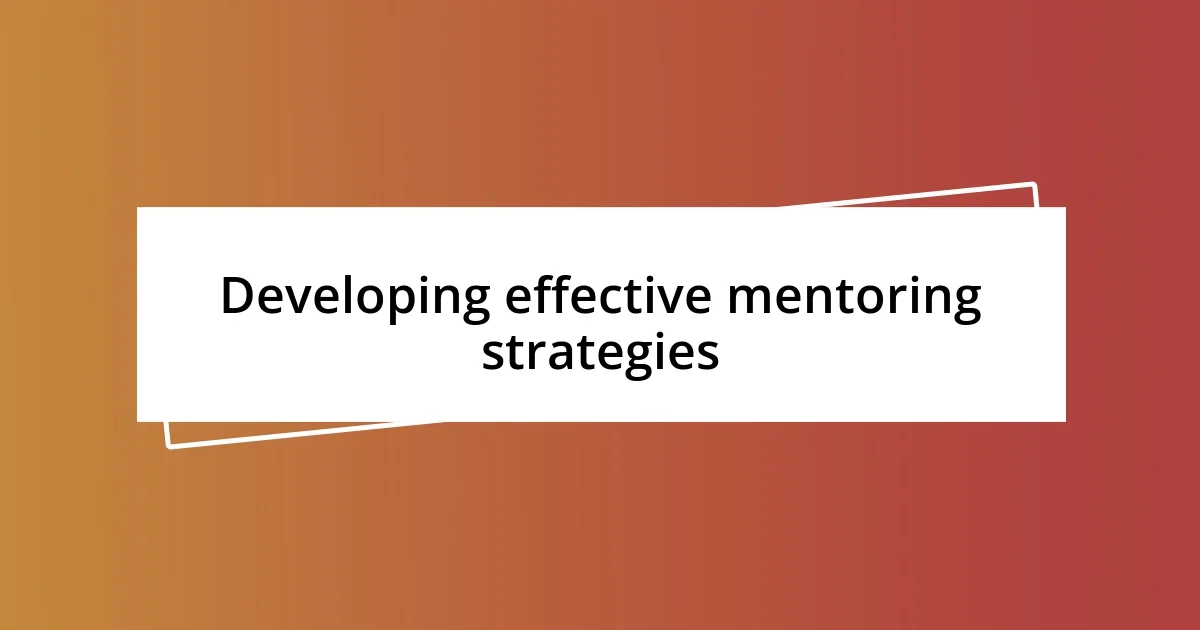
Developing effective mentoring strategies
When developing effective mentoring strategies, it’s crucial to establish a supportive environment that fosters open communication. I often start my mentorship by encouraging mentees to share their aspirations and past experiences in sustainability. This initial sharing creates trust, allowing us to delve deeper into their specific needs and ambitions. I’ve noticed that when mentees feel heard, they are more likely to engage in meaningful discussions that follow.
Strategies for effective mentoring include:
- Active Listening: Pay close attention to your mentee’s thoughts and feelings.
- Goal Setting: Collaboratively set achievable and inspiring goals to maintain motivation.
- Regular Check-Ins: Schedule consistent meetings to track progress and provide support.
- Feedback Loops: Create a constructive space for feedback to facilitate growth.
- Networking Opportunities: Connect mentees with industry professionals to broaden their perspectives.
Another aspect that I’ve found invaluable is tailoring my approach based on individual preferences. During my mentoring journey, I once worked with a young leader who thrived on hands-on learning rather than theoretical discussions. Shifting to project-based mentoring not only empowered them but also deepened their commitment to sustainability. It’s invigorating to witness their passion unfold when they engage with projects directly. This taught me that adaptability is vital; by personalizing my strategies, I can better support their unique paths.
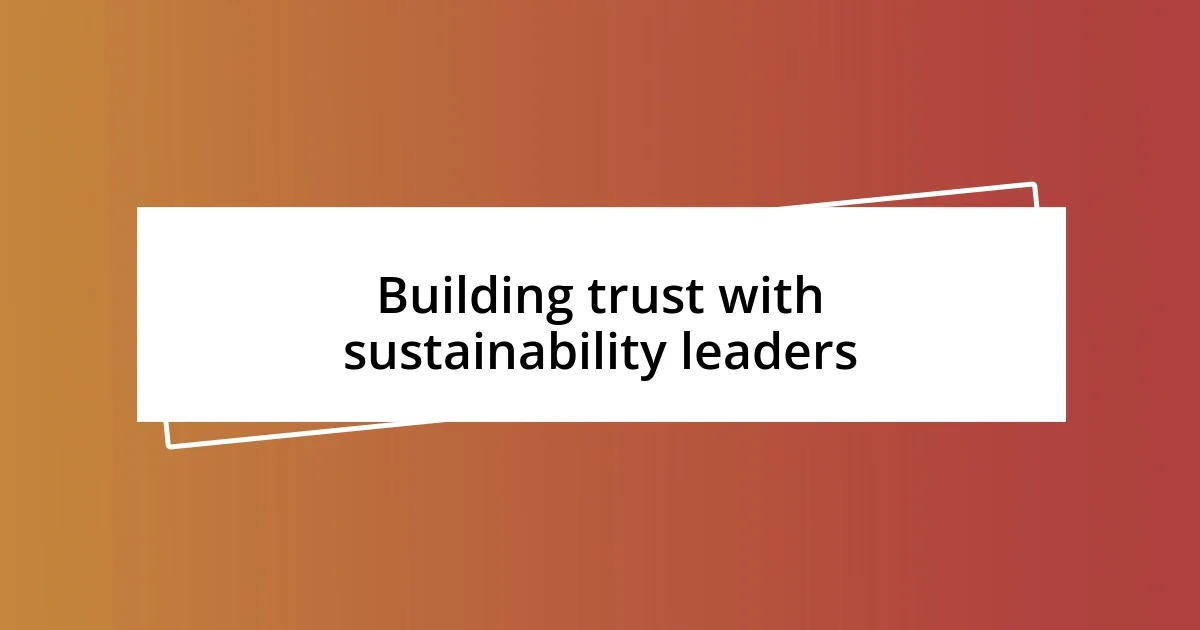
Building trust with sustainability leaders
Building trust with sustainability leaders is a vital part of fostering successful mentorship. One experience that stands out for me is when I mentored a leader who had just started a community garden initiative. Initially, they were hesitant to share their ideas. By showing genuine interest in their vision and encouraging them to express their thoughts openly, we slowly built a rapport. This mutual understanding enabled us to discuss innovative plans for the garden, and it made a world of difference in their confidence. Have you ever noticed how trust can transform a conversation?
I’ve come to believe that transparency is crucial in building trust. During our discussions, I shared my own missteps in sustainability projects, which made the mentee feel safer to discuss their challenges. This brought a sense of camaraderie, and it was refreshing to see how they began to embrace their struggles as learning opportunities. Isn’t it interesting how vulnerability can strengthen relationships in unexpected ways? Opening up about personal experiences can really bridge the gap between mentor and mentee.
Another essential element is consistency. I’ve seen how regular check-ins create a dependable framework that nurtures trust. With one of my mentees, we established weekly catch-ups to discuss their progress on sustainability initiatives. They grew to rely on our conversations as a safe space for exploration and reflection. It was encouraging to watch them flourish, blossoming into a more assured leader. Have you ever felt that sense of growth in someone you’ve guided? It’s truly fulfilling to witness.
| Trust-Building Element | Personal Experience |
|---|---|
| Mutual Understanding | Encouraged openness in a community garden initiative for confidence. |
| Transparency | Shared missteps to create camaraderie and foster learning. |
| Consistency | Weekly catch-ups led to a dependable environment for growth. |
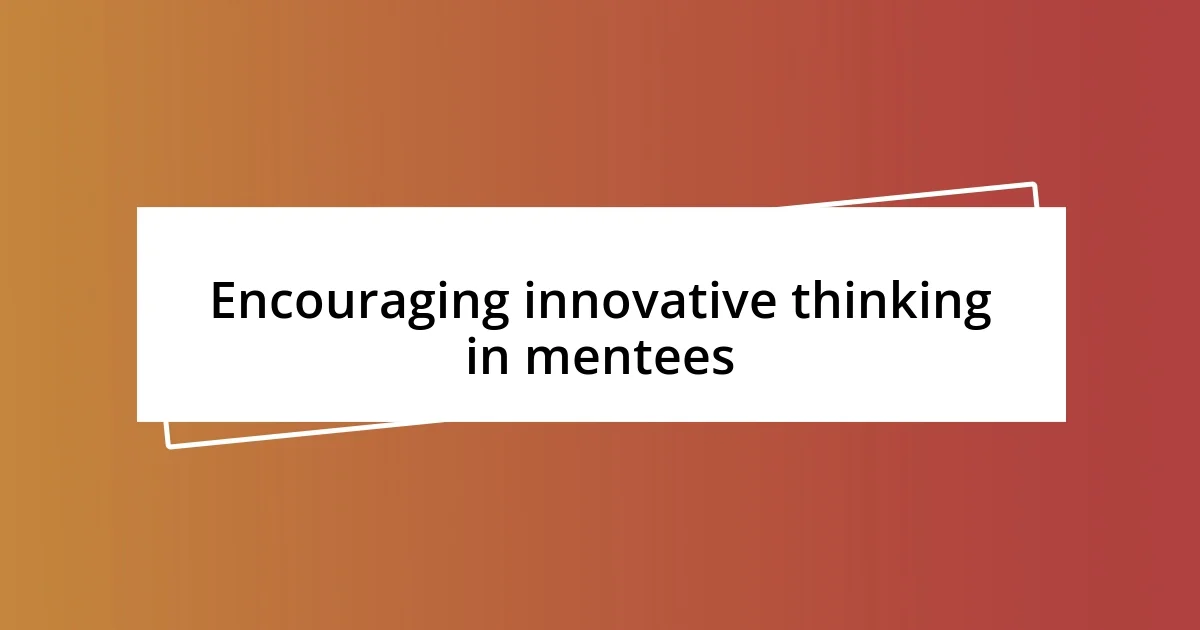
Encouraging innovative thinking in mentees
Encouraging innovative thinking in mentees is something I focus on actively during our sessions. I remember a particular instance when a mentee brought up a project idea that seemed a bit outlandish at first. Instead of dismissing it, I asked her to dive deeper into her thought process. This sparked a fascinating brainstorming session where we explored the potential impacts of her idea. It’s amazing how such open dialogue can lead to unexpected and innovative solutions, don’t you think?
I’ve found that introducing creative exercises can also stimulate innovative thinking. During one session, I suggested we do a “what-if” scenario, where we imagined the future of sustainable energy in ten years. This exercise allowed my mentee to visualize possibilities that weren’t limited by today’s reality. Watching her excitement grow as she envisioned her role in that future was incredibly rewarding. Isn’t it uplifting to see someone connect their dreams with practical steps?
Finally, I firmly believe in the power of diverse perspectives to fuel innovation. I often connect mentees with professionals from different fields—like artists or engineers—to broaden their horizons. One mentee, who initially had a background solely in environmental science, thrived after a lunch with an architect. Their conversation led to innovative ideas that blended ecology with architecture in a way both hadn’t considered. Have you ever seen two worlds collide to create something extraordinary? That’s the magic of fostering innovative thinking!
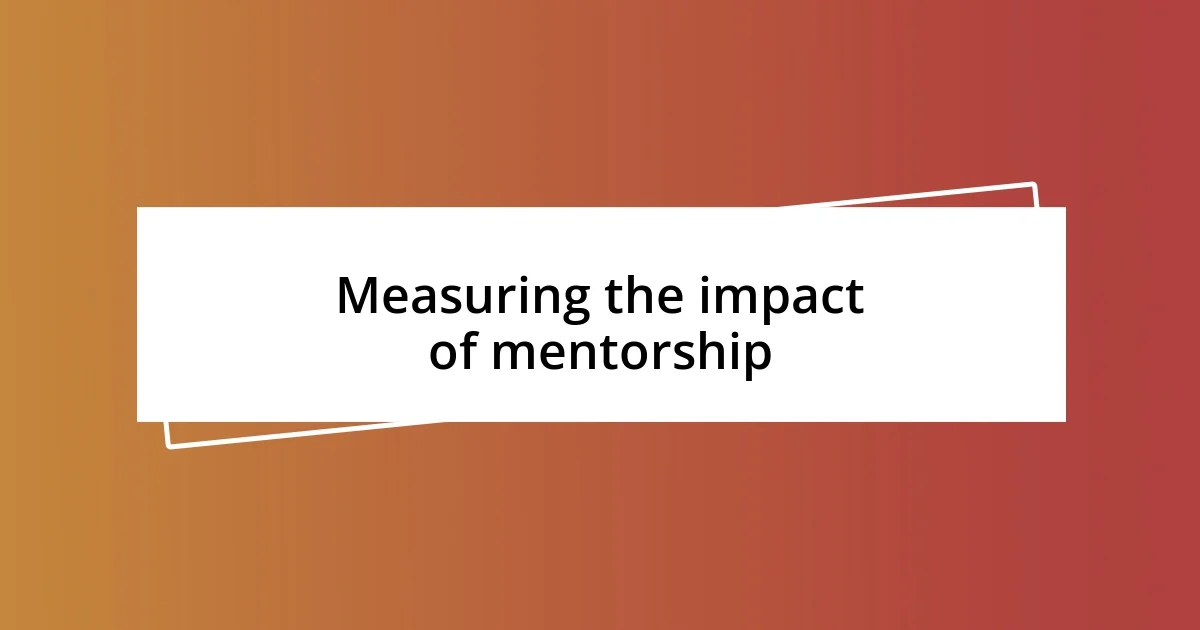
Measuring the impact of mentorship
Measuring the impact of mentorship can sometimes feel abstract, but I’ve found that tangible changes in a mentee’s confidence and abilities often tell a compelling story. For instance, I worked with a mentee who struggled with public speaking. After a dedicated mentorship period focused on developing those skills, I was thrilled to see her confidently present her sustainability project to a large audience. Have you ever witnessed someone blossom in a way that took you by surprise?
To quantify mentorship’s impact, I like to set specific goals and milestones right at the beginning. For one mentee, we outlined key performance indicators related to her initiative’s growth, like community engagement levels and project reach. By tracking these metrics, we could celebrate progress together, creating a sense of achievement that reinforced her motivation. Isn’t it fascinating how data can transform our perceptions of success?
Moreover, gathering feedback from different sources has proven invaluable. One time, I encouraged a mentee to seek input from their peers and stakeholders about their initiative. It opened up a conversation about strengths and areas for improvement. We used this feedback to iterate on her approach, not just measuring success but actively shaping it. Isn’t it powerful to think that the insights of others can guide us to better outcomes?
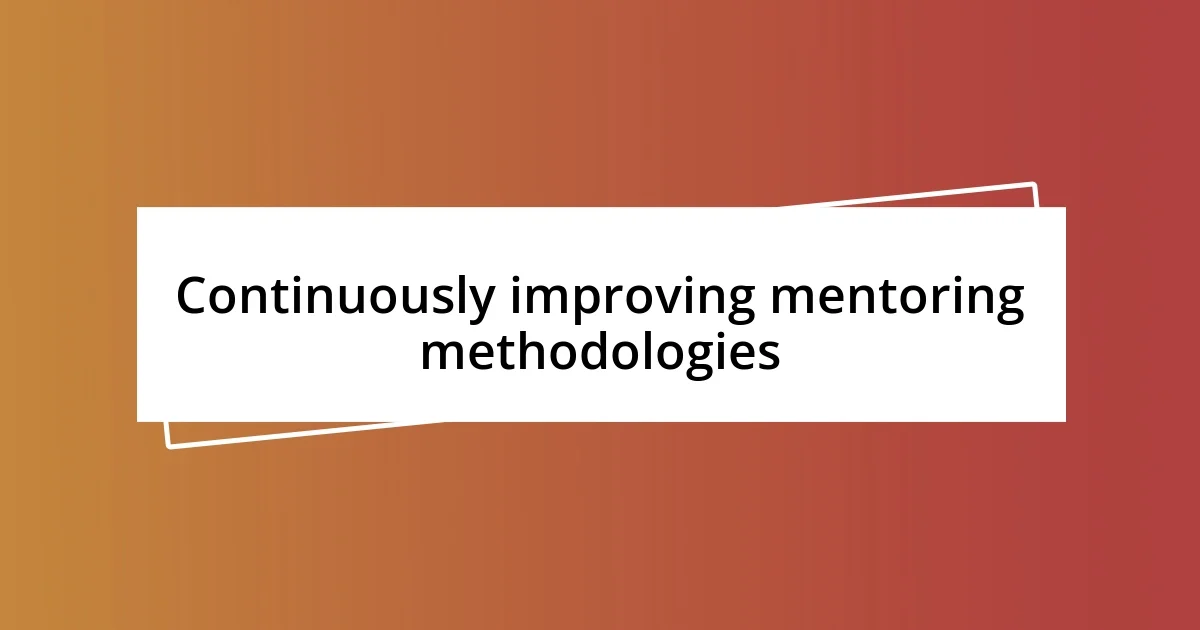
Continuously improving mentoring methodologies
I’ve come to realize that the evolution of my mentoring methodologies is an ongoing journey shaped by both experience and feedback. In one instance, after a particularly constructive discussion, a mentee suggested I introduce more peer-led sessions. This sparked a significant shift in my approach, allowing mentees to learn not just from me, but also from each other’s insights and experiences. Have you ever noticed how much we can grow when we let our mentees take the lead? The value of collaborative learning is profound, and it enhances the overall mentoring experience.
Another exciting development in my mentoring style has been the incorporation of technology to stay current with emerging trends. For example, I recently started utilizing online collaboration tools to facilitate real-time brainstorming sessions. This shift not only made discussions more dynamic, but it also allowed mentees to engage with sustainability leaders worldwide. Isn’t it incredible how technology can bridge gaps and inspire new ideas from diverse backgrounds?
I also make it a point to regularly review and adapt my mentoring methods. After each session, I take time to reflect on what worked and what didn’t, often jotting my thoughts down in a journal. I remember one mentee expressing that a structured agenda felt constricting; it was a lightbulb moment for me. I realized that flexibility is essential in fostering an organic learning atmosphere. How often do we rely on rigid frameworks instead of thriving in spontaneity? Embracing an adaptable approach not only enriches the mentoring experience but also empowers mentees to express their authentic selves.

